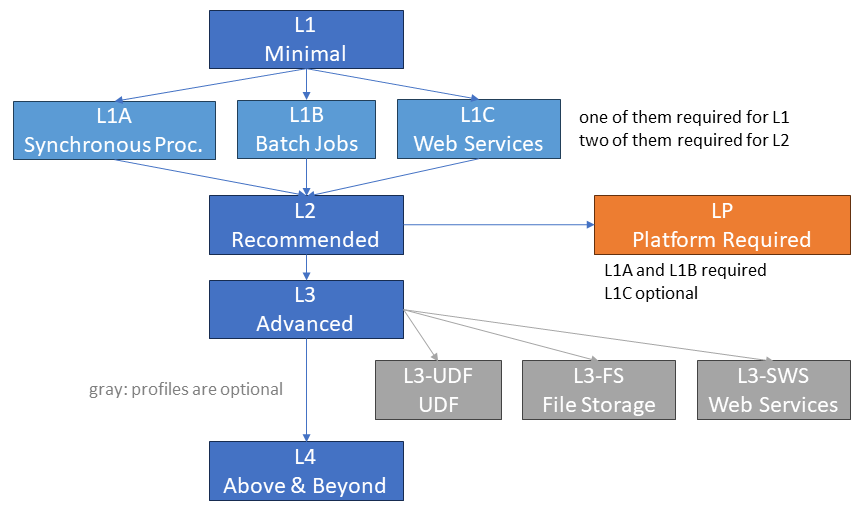# Federation API
The general contract is the openEO API (opens new window) in the latest stable version of the 1.x branch.
The aggregator that proxies the back-ends in the federation also implements the same API, but it also implements the "Federation Extension" (currently in draft state).
# Profiles
In addition to the general openEO API specification and their API Profiles (opens new window), openEO Platform requires to implement an additional API profile: LP: Required for openEO Platform, which requires the openEO profile L2: Recommended. The requirement to implement two of L1A, L1B, and L1C has been restricted for openEO Platform to always require L1A: Synchronous Processing and L1B: Batch Jobs (see req. no. 703). This means that L1C: Secondary Web Services is optional.

# LP: Required for openEO Platform
The profile only lists requirements that are not covered by the openEO profile L2: Recommended yet.
# API fundamentals
| # | Functionality | Description |
|---|---|---|
| 14 | All > Billing | Supports the openEO Platform credit system |
# File Formats
| # | Functionality | Description |
|---|---|---|
| 45 | GET /file_formats | File format names and parameters aligned with openEO Platform as defined for the pre-defined file formats |
# Other
| # | Functionality | Description |
|---|---|---|
| 90 | GET /health | Returns 2XX or 5XX http status code (without authentication) |
# Auth
| # | Functionality | Description |
|---|---|---|
| 113 | GET /credentials/oidc | Supports EGI as identity provider (including tokens) |
| 118 | GET /credentials/oidc | Supports the required entitlements of the vo.openeo.cloud virtual organization, especially the claim eduperson_entitlement |
For more details about Authentication and Authorization, please see the corresponding chapters below.
# Pre-defined Processes
| # | Functionality | Description |
|---|---|---|
| 205 | GET /processes > processes | All processes are valid according to the specification (id, description, parameters, returns are required) |
| 208 | GET /processes > processes | Processes are marked as experimental or deprecated if applicable |
# Collections
| # | Functionality | Description |
|---|---|---|
| 311 | GET /collections > collections | Collections are marked as experimental or deprecated if applicable |
| 324 | GET /collections/{id} > id | IDs follow the openEO Platform naming convention |
| 327 | GET /collections/{id} > providers | Each collection needs to expose the backend offering the data |
# Data Processing
| # | Functionality | Description |
|---|---|---|
| 703 | Batch jobs and synchronous processing are implemented (secondary web services are optional) | |
| 704 | Time after which batch job results get automatically deleted: 90 days or later | |
| 705 | Time after which batch job metadata gets automatically deleted: 1 year or later |
# Batch Jobs > Results
| # | Functionality | Description |
|---|---|---|
| 873 | GET /jobs/{id}/results > public access link | Default expiry time of the signed URLs for results: 7 days |
# Synchronous Processing
| # | Functionality | Description |
|---|---|---|
| 920 | POST /result > timeout | The timeout for synchronous calls is: 5 minutes |
# Authentication and authorization
This important aspect of the federation is standardized by the AARC Blueprint Architecture (opens new window). EGI Check-in is the concrete implementation that is currently in use.
# Authentication
The openEO platform federation standardizes on the use of EGI Check-in (opens new window) as identity provider. Backends have to support the use of openID connect + PKCE, to enable this and register a client with EGI Check-in.
# Authorization
# Entitlements
Users of the federation are organized under the 'vo.openeo.cloud' virtual organization in EGI Check-in. Inside the virtual organization, different roles can be assigned to a user, to indicate that they have a certain subscription, or even on a more fine-grained level are entitled to specific actions or resources. The mechanism to check this, is again supported by EGI Check-in, under the 'eduperson_entitlement' claim: https://docs.egi.eu/providers/check-in/sp/#claims (opens new window)
# Credits
The second criterium for authorization is based on credits that are available to a user. Credits allow the platform to limit the volume of data access and processing operations that a user can perform during a given time frame. The amount of available credits depends on the subscription. When the credit balance of a user goes below zero, processing operations can be blocked.
# Aggregator rules
Based on the subscription and available credits, the aggregator can implement these rules:
- Credit checks to block starting of batch jobs, synchronous requests to /result and viewing services.
- Rate limiting (TBD)
# Backend rules
Some authorization rules will need to be enforced by the backends themselves:
- Basic access and access to user specific resources based on subscription role.
- Number of concurrent batch jobs
- Available processing resources, batch job priorities
- Batch job result data volume
- Access to restricted collections
